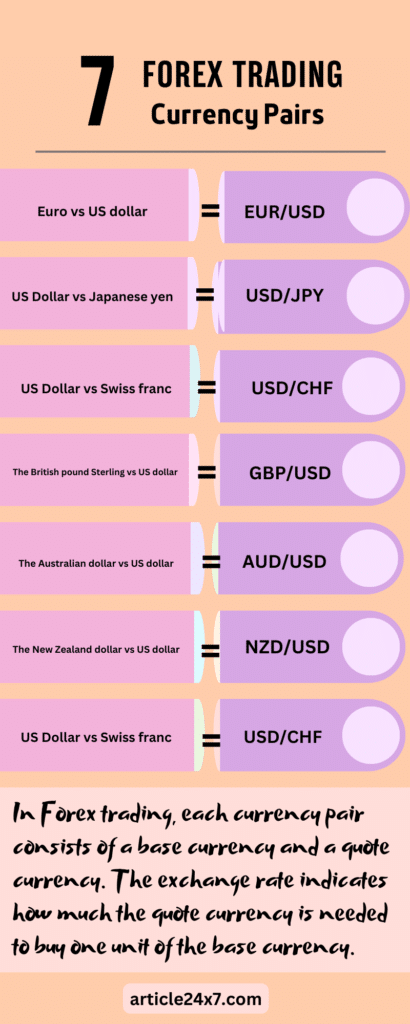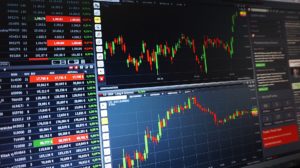Forex Markets And How It Work
Welcome to the world of Forex, where currencies dance to the tune of global economics, politics, and human psychology. You’re in the right place if you’ve ever wondered about those mysterious Forex markets and how they work. In this post, we are demystifying the forex market and how it works. We will unravel the complexities of Forex trading, shedding light on its mechanisms, key players, and the tools you need to navigate this dynamic landscape.
A global decentralised marketplace where individuals and banks trade various currencies without needing a centralised location is called the Forex Market. The Foreign Exchange Market is the world’s number one financial trading market and sees an average daily trade volume of about $6.6 trillion. Participants in the market include banks, large corporations, governments, and individual traders. The key players in this market are big international banks that always ensure enough liquidity for trading. Trading in the forex market can happen every day. One needs to closely monitor the economy’s performance, global events, and market sentiment to understand how it works. While the forex market provides opportunities for traders to profit from changes in currency values, it is also risky due to its volatility.
Forex markets, short for foreign exchange markets, are the most significant financial markets globally, dwarfing all other markets in daily trading volume. They are the backbone of international trade and investment, facilitating currency exchange between nations. But beyond their role in commerce, Forex markets offer opportunities for individuals to speculate on currency movements and potentially profit from them.
What are Forex Markets?
At their core, Forex markets are decentralised platforms where currencies are traded 24 hours a day, five days a week. Unlike stock markets, Forex markets don’t have a physical location. Instead, trading occurs electronically over computer networks worldwide.
In Forex trading, currencies are always exchanged in pairs, reflecting the worth of one currency with another. The EUR/USD pair denotes the Euro against the US Dollar and is the most heavily traded currency pair. When trading a currency pair, one essentially acquires one currency while concurrently selling the other.
The Role of Participants
Forex markets are a bustling ecosystem populated by various participants, each with distinct objectives and influence. The key players in Forex trading include:
- Central Banks: These institutions are pivotal in shaping currency valuations through monetary policy decisions, such as interest rate adjustments and quantitative easing measures.
- Financial Institutions: Banks, hedge funds, and other financial entities engage in Forex trading to facilitate client transactions, manage currency risks, and speculate on price movements.
- Corporations: Multinational corporations participate in Forex markets to hedge against currency risk exposure from international trade and investments.
- Retail Traders: Individual traders, like you and me access Forex markets through online platforms to speculate on currency movements for profit.
Each participant contributes to market liquidity and price discovery, creating opportunities for traders to buy and sell currencies at competitive prices.
Key Players in Forex Trading
The key players in forex trading include banks, financial institutions, corporations, governments, and individual traders.
Five prominent players in forex trading include:
- JPMorgan Chase & Co.
- Deutsche Bank AG
- Citigroup Inc.
- Barclays PLC
- UBS Group AG

How Trades Are Executed
Executing trades in Forex markets involves a straightforward yet crucial process:
- Placing Orders: Traders can set various orders, including market orders, limit orders, and stop-loss orders, depending on their trading strategies and risk tolerance.
- Order Matching: Orders submitted by traders are matched with counterparties willing to buy or sell at the specified price. This process occurs instantaneously through electronic trading platforms.
- Transaction Confirmation: Once an order is matched, the trade is executed, and traders receive confirmation of their transaction, including details such as price, volume, and execution time.
Forex Trading
To embark on your Forex trading journey, you’ll need the following essentials:
- A reliable internet connection to access trading platforms and market data.
- A trading platform or brokerage account to execute trades and manage your portfolio.
- Basic knowledge of fundamental analysis to interpret economic indicators and news events.
- Familiarity with technical analysis tools to identify trends and patterns in price charts.
With the help of these resources, you will be well-equipped to explore the thrilling Forex trading market.
How Forex Markets Work
Factors Influencing Exchange Rates
The value of currencies in Forex markets is influenced by a myriad of factors, including:
- Economic Indicators: Key financial data such as GDP growth, inflation rates, and employment figures can impact currency valuations by signalling the health of an economy.
- Geopolitical Events: Political instability, trade tensions, and geopolitical conflicts can create uncertainty in Forex markets, leading to volatility in currency prices.
- Central Bank Policies: Monetary policy decisions, such as interest rate changes and quantitative easing programs, directly affect currency supply and demand, influencing exchange rates.
Understanding the interaction between these elements is crucial for predicting currency value changes and making informed trading decisions.
Understanding Currency Pairs
In Forex trading, each currency pair consists of a base currency and a quote currency. The exchange rate indicates how much the quoted currency is needed to buy one unit of the base currency.
Forex markets are used to trade currencies; in the EUR/USD currency pair, the Euro (EUR) is the base currency, while the US Dollar (USD) is the quote currency. If the exchange rate for EUR/USD stands at 1.20, it signifies that 1 Euro can be bought with 1.20 US Dollars.
Market Analysis Techniques
Successful Forex trading requires a blend of fundamental and technical analysis techniques:
- Fundamental Analysis: Fundamental Analysis examines economic indicators, central bank policies, and geopolitical events to evaluate the factors influencing currency valuations.
- Technical Analysis: Technical analysis involves traders utilising charts, trend lines, and technical indicators to identify patterns and trends in price movements, aiding them in predicting future price directions.
By combining these analytical tools, traders understand market dynamics and make more informed trading decisions.

Ways to manage risk in Forex trading:
- Position Sizing: Position sizing involves determining the suitable position size for each trade, considering your risk tolerance and account size to ensure that potential losses remain within acceptable limits.
- Stop-loss orders: Set stop-loss orders to automatically exit losing trades at predetermined price levels, preventing excessive losses.
- Risk Management Techniques: Implement risk management strategies such as diversification, hedging, and scaling in/out of positions to minimise downside risk.
Ways to stay updated on market developments:
- News Alerts: Subscribe to news services or set up alerts for economic indicators, central bank announcements, and geopolitical events that may impact currency prices.
- Market Analysis: Market analysis involves consistently conducting technical and fundamental analyses to assess market trends and identify potential trading opportunities.
- Community Forums: Participate in online trading communities, forums, and social media groups to share insights, learn from experienced traders, and stay abreast of market sentiments.
Methods for conducting thorough market analysis before placing trades:
- Fundamental Analysis: Analyse economic indicators, central bank policies, and geopolitical events to gauge the underlying fundamentals driving currency valuations.
- Technical Analysis: Use charts, trend lines, and technical indicators to identify patterns and trends in price movements, helping to anticipate future price directions.
- Sentiment Analysis: Assess market sentiment through indicators such as the Commitments of Traders (COT) report or social media sentiment analysis tools to gauge the collective mood of market participants.
Related articles:
Forex Exchange How Forex Markets Works
What Is Forex Trading And How Does It Work
Trading Forex You Will Be Amazed At This 6 Amazing Benefits
Methods for identifying high-probability trading opportunities:
- Trend Following: Trend Following involves identifying price movement trends and trading aligned with the prevailing trend. This strategy often utilises indicators like moving averages or trend channels to confirm the direction of the trend.
- Breakout Trading: Identify consolidation patterns or support/resistance levels and enter trades when prices break out of these levels, signalling potential momentum shifts.
- Reversal Patterns: Recognise chart patterns such as head and shoulders, double tops/bottoms, or candlestick patterns indicating potential trend reversals and trade accordingly.
Conclusion
Forex markets provide an intriguing landscape for traders exploring opportunities in the global currency domain. By grasping the basics of Forex trading, honing market analysis skills, and implementing effective risk management strategies, you can adeptly navigate the intricacies of Forex markets. It’s crucial to maintain discipline, continuously expand your knowledge, and adjust to changing market dynamics to excel in the dynamic realm of Forex trading. Consider subscribing to our newsletter for further tips, insights, and updates on Forex trading. Wishing you successful trading endeavours!

[FAQ] Frequently Asked Questions And Answers
Is it possible to trade Forex markets profitably?
Yes, trading Forex markets profitably with the proper knowledge, skills, and discipline is possible. Successful traders employ sound risk management strategies, conduct thorough market analysis, and adhere to a well-defined trading plan.
Is it possible to learn Forex trading without prior experience?
While prior experience in financial markets can be advantageous, anyone with dedication and a willingness to learn can acquire the knowledge and skills needed to trade Forex successfully. Numerous educational resources, online courses, and demo accounts are available to help beginners get started.
Can you trade Forex markets on a part-time basis?
Absolutely! Many Forex traders engage in trading on a part-time basis while balancing other commitments such as work or education. With the flexibility of online trading platforms and 24-hour market access, you can trade Forex at your convenience.
Can you automate Forex trading with algorithms or expert advisors?
You can automate Forex trading using algorithms or expert advisors (EAs). These automated trading systems execute trades without manual intervention, relying on pre-defined criteria like technical indicators or trading strategies. However, it’s essential to thoroughly test and optimise your trading algorithms to ensure their effectiveness and reliability.
Why should you consider including Forex trading in your investment portfolio?
Forex trading offers several benefits as part of a diversified investment portfolio, including:
- Liquidity: Forex markets are highly liquid, with trillions of dollars traded daily, ensuring easy entry and exit for traders.
- 24-Hour Market: Unlike stock markets, Forex markets operate 24 hours a day, five days a week, allowing traders to react swiftly to global events and news.
- Diversification: Adding Forex trading to your portfolio diversifies your investment holdings, potentially reducing overall portfolio risk.
Why should you diversify your trading strategies in Forex markets?
Diversifying your trading strategies in Forex markets helps mitigate risk and enhance profitability. By employing a mix of trading techniques, such as trend following, range trading, and counter-trend trading, you can adapt to different market conditions and capitalise on diverse trading opportunities.
What is leverage in Forex trading, and how does it work?
Leverage allows traders to control more prominent positions in the market with a smaller amount of money. For example, with a leverage of 1:100, you can maintain a position worth $100,000 with a margin of $1,000. While leverage amplifies potential profits, it also magnifies potential losses, making it essential to use leverage cautiously and implement proper risk management strategies.
How do interest rates affect currency exchange rates?
Interest rates impact currency exchange rates by influencing the appeal of a country’s assets. Elevated interest rates allure foreign investors in search of superior investment returns, thus escalating demand for the currency and augmenting its value. Conversely, diminished interest rates may prompt capital outflows and currency devaluation.
Can I trade Forex markets with a small account size?
Yes, you can trade Forex markets with a small account size, thanks to the availability of leverage offered by brokers. However, managing your risk carefully and avoiding overleveraging is crucial, as excessive leverage can amplify losses and deplete your account quickly.
What are the risks with Forex trading?
Forex trading involves inherent risks, including:
- Market Risk: Fluctuations in currency prices can result in substantial gains or losses for traders.
- Leverage Risk: Using leverage magnifies profits and losses, increasing the risk of significant drawdowns.
- Counterparty Risk: Trading with unregulated or unreliable brokers poses the risk of financial loss due to broker insolvency or fraud.
- Operational Risk: Technical glitches, internet connectivity issues, or platform malfunctions can disrupt trading activities and result in financial losses.
What criteria should be used to select a trustworthy Forex broker?
When deciding on a reputable Forex broker, it’s essential to factor in the following considerations:
- Regulation: Opt for a broker regulated by respected financial regulators like the UK Financial Conduct Authority or the US Securities and Exchange Commission to ensure compliance with rigorous regulatory requirements.
- Security: Opt for brokers offering robust security measures, such as encryption protocols and segregated client funds, to safeguard your capital and personal information.
- Trading Conditions: Evaluate trading conditions such as spreads, commissions, leverage, and execution speed to ensure competitive pricing and optimal trading experience.
- Customer Support: Look for brokers offering responsive customer support services to promptly address your inquiries and concerns.

